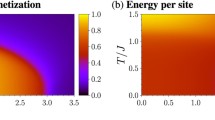Abstract
The fluctuation-dissipation theorem (FDT) plays a fundamental role in understanding quantum many-body problems. However, its applicability is limited to equilibrium systems and it does in general not hold in nonequilibrium situations. This violation of the FDT is an important tool for studying nonequilibrium physics. In this paper we present results for the violation of the FDT in the Kondo model where the impurity spin is frozen for all negative times, and set free to relax at positive times. We derive exact analytical results at the Toulouse point, and results within a controlled approximation in the Kondo limit, which allow us to study the FDT violation on all time scales. A measure of the FDT violation is provided by the effective temperature, which shows initial heating effects after switching on the perturbation, and then exponential cooling to zero temperature as the Kondo system reaches equilibrium.
Similar content being viewed by others
References
H. B. Callen and T. A. Welton, Phys. Rev. 83:34–40 (1951).
K. H. Fisher and J. A. Hertz, Spin Glasses (Cambridge Univ. Press, 1991).
P. Calabrese and A. Gambassi, J. Phys. A: Math. Gen. 38:R133–R193 (2005).
L. F. Cugliandolo and G. Lozano, Phys. Rev. B 59:915 (1999).
G. Biroli and O. Parcollet, Phys. Rev. B 65:094414 (2002).
L. F. Cugliandolo, D. R. Grempel, G. Lozano, H. Lozza, and C. A. da Silva Santos. Phys. Rev. B 66:014444 (2002).
L. F. Cugliandolo, D. R. Grempel, G. Lozano and H. Lozza, Phys. Rev. B 70:024422 (2004).
F. Iglói and H. Rieger, Phys. Rev. Lett. 85:3233 (2000).
P. Calabrese and J. Cardy, JSTAT 0504:P010 (2005).
N. Pottier and A. Mauger, Physica A 282:77–107 (2000).
D. Goldhaber-Gordon, H. Shtrikman, D. Mahalu, D. Abusch-Magder, U. Meirav, and M. A. Kastner, Nature (London) 391:156–159 (1998); S. M. Cronenwett, T. H. Oosterkamp, and L. P. Kouwenhoven, Science 281:540 (1998); J. Schmid, J. Weis, K. Eberl, and K. von Klitzing, Physica B 258:182–185 (1998).
P. Nordlander, M. Pustilnik, Y. Meir, N. S. Wingreen, and D. C. Langreth, Phys. Rev. Lett. 83:808–811 (1999).
D. Lobaskin and S. Kehrein, Phys. Rev. B 71:193303 (2005).
L. D. Landau and E. M. Lifshitz, Statistical Physics Part 1, Sect. 124–126 (Pergamon Press, 3rd ed., 1980).
R. Kubo, Can. J. Phys. 34:1274 (1956); R. Kubo, J. Phys. Soc. Japan 12:570 (1957); R. Kubo, J. Phys. Soc. Japan 17:975 (1962).
G. Toulouse, C. R. Acad. Sci. Paris 268:1200 (1969).
L. F. Cugliandolo, J. Kurchan, and L. Peliti, Phys. Rev. E 55:3898–3914 (1997).
F. Lesage and H. Saleur, Phys. Rev. Lett. 80:4370–4373 (1998).
P. Calabrese and A. Gambassi, J. Stat. Mech. P07013 (2004).
Author information
Authors and Affiliations
Corresponding author
Rights and permissions
About this article
Cite this article
Lobaskin, D., Kehrein, S. Violation of the Fluctuation-Dissipation Theorem and Heating Effects in the Time-Dependent Kondo Model. J Stat Phys 123, 301–313 (2006). https://doi.org/10.1007/s10955-006-9055-5
Received:
Accepted:
Published:
Issue Date:
DOI: https://doi.org/10.1007/s10955-006-9055-5




